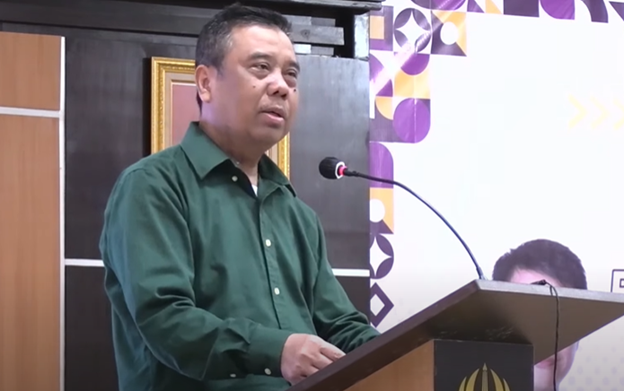Unesa.ac.id., SURABAYA—Higher education in Indonesia faces three priority challenges, namely gaps in access , quality gap, and relevance gap. This was conveyed by the Director General of Higher Education, Research and Technology (Dirjen Diktiristek), Kemendikbudristek, Prof. Dr. rer. Nat. Abdul Haris, M.Sc., in the Education Month FGD at UNESA on Saturday, May 4 2024.
First, regarding the access gap, the Director General of Diktiristek stated that the gross participation rate for access to higher education in Indonesia is in the range of 30- 40%. This means that the number of high school/vocational school/equivalent graduates who go to college is still limited. This figure is still below Vietnam and Thailand, let alone Singapore.
Second, the quality gap. The number of PTN and PTS in Indonesia is fantastic, namely around 4,356 universities. The large number of universities creates gaps in quality, both from the learning aspect, to the lecturers.
Third, the lack of relevance of higher education. With the presence of the independent learning program, the gap between college graduates and the needs of the industrial world is increasingly narrowing.
In order to answer this gap, the policy direction and strategy of the Directorate General of Higher Education is to increase participation rates for access to higher education, improve quality and relevance, and improve the quality of lecturers and educational staff.
Next is improving higher education governance, and strengthening the vision of research, innovation and community service. "This is a big job that we have done to solve the three priority problems," he said.
With the complexity of today's challenges, strong cooperation and collaboration is needed from all higher education stakeholders in answering priority problems through the mission of moving together to continue independent learning.
The Professor of Geophysics at the Faculty of Mathematics and Natural Sciences, University of Indonesia, highlighted UNESA PTNBH's commitment to becoming a world class university.
There are several things that need to be considered to become a world-class university, namely international standard teaching, world-recognized research, innovation capacity that is able to solve the nation's problems.
Then, it is able to produce global talents, both lecturers, students and graduates. Apart from that, there is also a world-class partnership network, superior and competitive graduates, many foreign lecturers and students, and contributes to increasing the country's foreign exchange through foreign students, downstream research and international cooperation.
"Being a world-class PTNBH has many challenges such as funding, quality of human resources, learning and research facilities and infrastructure, fulfilling lecturers' wishes, uneven student quality and lack of strong synergy," he explained.

Vice Chancellor for Academic, Student and Alumni Affairs, Prof. Dr. Madlazim, M.Si., delivered the content of the UNESA Chancellor's remarks, Prof. Dr. Nurhasan, M.Kes.
UNESA Chancellor Prof. Dr. Nurhasan, M.Kes., as in his speech read by the Vice Chancellor for Academic, Student and Alumni Affairs, Prof. Dr. Madlazim, M.Sc., said that this FGD carried the theme "Moving Together to Continue Freedom of Learning". This theme is a call to all to continue to move forward together and tirelessly pursue high goals and gain lifelong knowledge.
Freedom to learn is not just words, but a spirit that burns within each individual to keep learning, growing and inspiring. Freedom to learn teaches that learning does not only happen in the classroom, but anywhere you can learn and develop.
"Let's use this month of education as a momentum to increase enthusiasm for learning, quality of learning, and collaboration between all parties involved. involved in the world of education. "Let us unite, synergize, and together move towards the noble ideals of creating a generation that is intelligent, moral and ready to face future challenges," he said.
This FGD was attended by UNESA leadership, starting from the MWA, SAU, vice chancellors, deans, directors, heads of institutions, program coordinators, and lecturers around the 'Home of Champions' campus. Apart from that, a number of other higher education leaders were also present.[]
***
Reporters: Lina Lubabatul Karimah (FBS) and Rafa Afifah (Fisipol)
Editor: @zam*Photo: Public Relations Team Documentation
Share It On:






